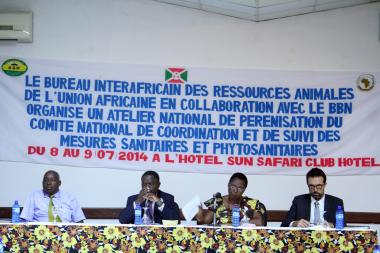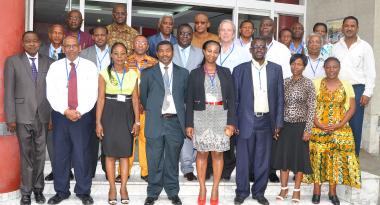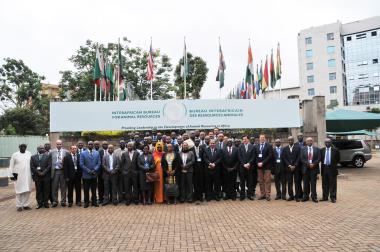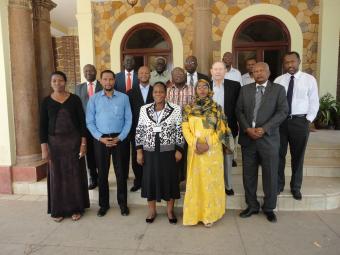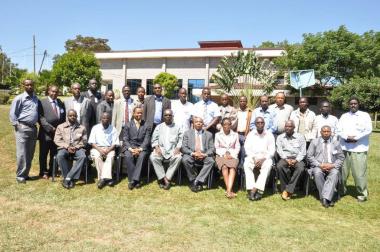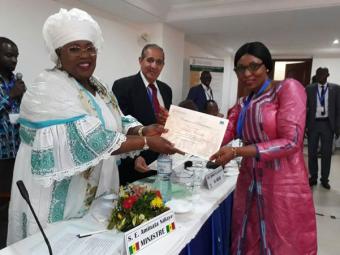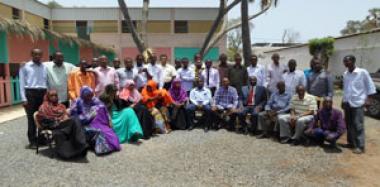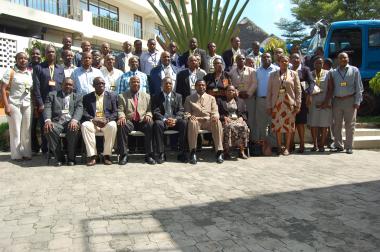
Naivasha, Kenya - September 13-14, 2023
Africa's aquatic ecosystems hold tremendous potential for sustainable development and food security on the continent. The "Conserving Aquatic Biodiversity in Africa Blue Economy" Project, a collaborative effort among various stakeholders, is poised to unlock this potential. The Project is funded by the Swedish International Development Cooperation Agency (SIDA). The second Project Technical Committee meeting, currently underway in Naivasha, Kenya from September 13-14, 2023, marks a significant milestone in this crucial endeavour. Together, we are navigating the waters towards a more sustainable future for Africa's aquatic environments.
Diverse Participation
The meeting has attracted a diverse group of participants, including members of the Project Technical Committee and valued partners. Drawing from various countries, such as Cote d'Ivoire, Kenya, Tanzania, and several Regional Economic Communities (RECs - ECCAS and EAC), this gathering represents a united front in the pursuit of aquatic biodiversity conservation. Partner institutions, including the Abidjan Convention, IUCN, regional fisheries bodies, women representatives, FAO regional office, and Lake Victoria Fisheries Organisation, among others, are contributing their expertise to the project. Notable institutions like Kwame University, KAMFRI (focused on mangrove restoration), and Centres of Excellence at the University of Cape Coast are also actively engaged. Togo and Benin Republic, as well as the Swedish Agency for Marine and Water Management, and UNESCO, Western Indian Ocean Marine Science Association, among others have joined hands to shape the project's trajectory.
Visionary Addresses

The event commenced with a thought-provoking speech by Dr. Huyam Salih, Director of AU-IBAR (Far left in above photo). Dr. Salih highlighted the African Blue Economy Strategy, emphasizing its significance in addressing the critical need to harness aquatic resources for food security and sustainable development. Dr. Salih called upon the assembly to evaluate progress and foster synergy among partners, providing valuable guidance for the upcoming Steering Committee meeting scheduled for September 15, 2023.
Dr. Ndiaga Gueye (Right in above photo) from the FAO Regional Office in Africa followed with a compelling address. He stressed the multitude of threats facing our oceans and waters and the imperative to invest more significantly while recognizing the complementary efforts of stakeholders. Dr. Gueye emphasized the importance of aligning instruments and harmonizing the voices of African countries to address these challenges effectively.
Kenya's Perspective
Dr. Charles Ogwang, representing the Director of Fisheries and Blue Economy, Kenya, added his insights, noting that sustainable conservation efforts of Conserving Aquatic Biodiversity Project share commonalities with existing initiatives in Kenya. He advocated for enhanced collaboration, emphasizing that shared responsibility lightens the burden. Dr. Ogwang underlined the importance of socially inclusive interventions and the development of master plans. He also hailed the concept of the blue economy as a transformative idea, acknowledging the pressing concern of marine litter and the need for global interaction on this issue.
Agenda Highlights
Over the course of two days, the meeting's agenda covers a broad spectrum of topics:
• Session 1: Setting the Scene Presentations (presentation of the 1st Project Technical Committee; Progress of technical implementation and emerging issues)
• Session 2: Progress of Implementation - Collaboration Narratives by Partners, Experts, and Beneficiaries (Economic Community of Central African States - ECCAS)
• Session 3: Progress of Implementation - Collaboration Narratives by Partners, Experts, and Beneficiaries (East Africa Community - EAC)
• Session 4: Project Presentations on Budget, Communications, Procurement, and the 2024 Workplan
In the upcoming Session 2 of the conference, a series of insightful presentations will shed light on critical topics. These will include efforts to strengthen the Regional MCS (Monitoring, Control, and Surveillance) center, aimed at combating Illegal, Unreported, and Unregulated (IUU) fishing, as well as initiatives to protect aquatic biodiversity and the environment within the FCWC (Fishery Committee for the West Central Gulf of Guinea) Region. Another presentation will focus on supporting climate change mitigation in coastal communities in Kenya, while another will aim to facilitate the establishment of a transboundary Marine Protected Area (MPA) between Kenya and Tanzania. Furthermore, there will be a discussion on collaboration to bolster the ongoing transboundary Marine Spatial Planning (MSP) initiative between Benin and Togo.
Session 3 will bring forth an equally diverse range of presentations. Topics will cover gender mainstreaming in community-based non-governmental organizations (NGOs) dedicated to aquatic biodiversity and environmental conservation. Another presentation will highlight support for AU member states in developing Masterplans and Regulatory Frameworks for sustainable coastal and marine tourism and mining activities, with a pilot study conducted in Kenya. The session will also address aquatic biodiversity conservation and environmental management in transboundary freshwater ecosystems, supporting national strategies with a pilot study conducted in shared ecosystems of Lake Victoria. Additionally, participants will explore mechanisms for effective participation in global forums related to aquatic biodiversity conservation and environmental management in Africa and will learn valuable lessons and best practices in institutionalizing transboundary Marine Spatial Planning (MSP), drawing from experiences outside of the continent. These presentations will collectively showcase a broad spectrum of initiatives aimed at fostering sustainability and conservation in Africa's aquatic environments.
The gathering will conclude with in-depth discussions, formulation of recommendations, and a plenary session for the review and adoption of the communique and recommendations.
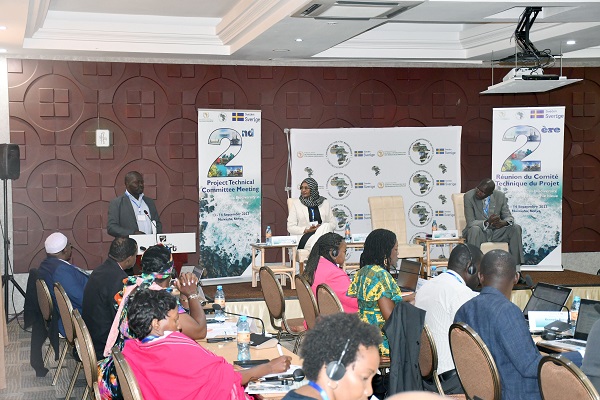
As the second Project Technical Committee meeting takes place in Naivasha, Kenya, we set sail on a collective mission to protect Africa's aquatic biodiversity. This cooperative endeavour extends beyond the preservation of ecosystems; it's a commitment to secure sustainable development and food security for our continent. Together, we are charting a sustainable path for Africa's aquatic future, working diligently to unify voices, safeguard our water resources, and nurture comprehensive growth across the region. This project is a vital contributor to the realization of Policy Framework and Reform Strategies for Fisheries and Aquaculture in Africa (PFRM), Africa Blue Economy Strategy, Agenda 2063, Malabo Declaration and other overarching development strategies.

